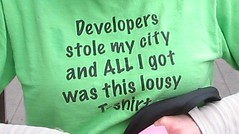Closing 4 Boys and Girls Clubs in DC...
Thie closing of four of DC's Boys and Girls Clubs, as discussed on neighborhood e-lists, and in Marc Fisher's Sunday column in the Post, is but another example of the question of the proper stewardship of public assets, an issue that has been raised by Empower DC, school activists, library assets, myself, and others over the past few years. We argue that too often development interests shape the agenda and that the public interest is either not represented or underrepresented..
Note that I am not necessarily against mixed use redevelopment projects involving public assets, although DC particularly for the most part doesn't have good examples, unlike other cities. Too often the developer gets the far better part of the detail. There are some exceptions, the redevelopment of the Sumner and Magruder Schools is probably the best example. Sumner was renovated by the developer of a building on the playground. The developer is required to maintain the school building through the period of the 99 year lease -- which is why I joke that Sumner School is the best maintained publicly owned asset in DC. At the end of the lease, the site and the office building revert to the city.
Even though the Boys and Girls Clubs are not publicly owned by the city, there is a public interest maintained here. In other states, such as Pennsylvania, in the matter of charitable public trusts such as the Hershey Trust, the Girard Trust, and the Barnes Foundation, the State Attorney General takes an active role in reviewing, monitoring, and changing proposed deals, to represent the public interest.
This should be done here--the DC Attorney General Charitable Trust Division should step up to the plate--although the City Government doesn't have a strong track record of doing so in the face of developer demand.
Another option is eminent domain. There are some instances where eminent domain is a reasonable step for a municipality to take, when otherwise property owners aren't amenable to "discussing" the issues at hand.
(I tend to oppose the exercise of eminent domain authority because I think too often the process is tainted by the developers, and is unfair, however when exercised properly it is not a tool that should automatically be opposed. See this op-ed from the Boston Globe for a good discussion of this: )
Finally, there was a protest recently in Seattle about the proposed construction of a mall in the city, in an Asian community. One person wore this tee shirt. I think it's a concise summary of these kinds of issues.

Photo from the Pooshkin blog.
Labels: Growth Machine, neighborhood change, public assets



0 Comments:
Post a Comment
<< Home